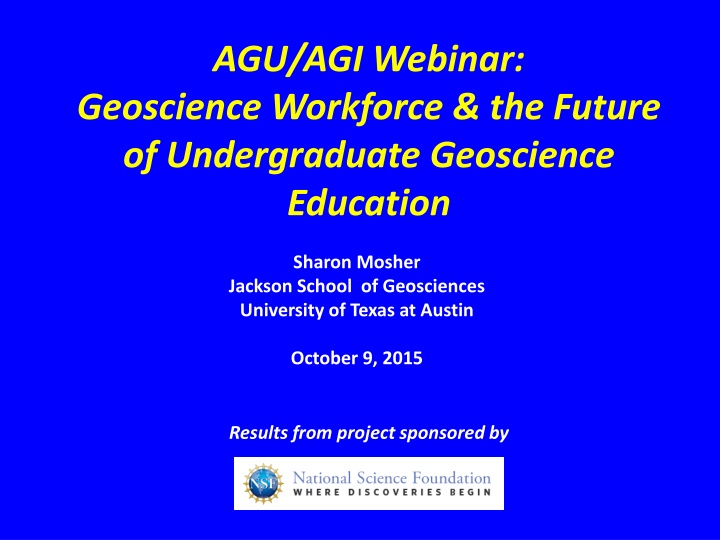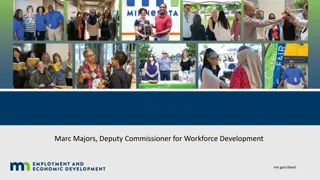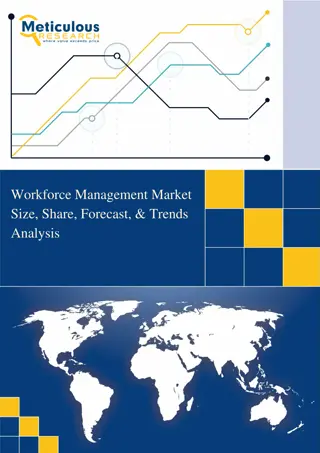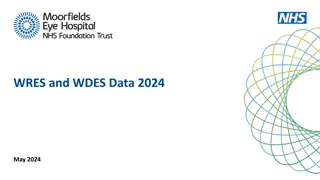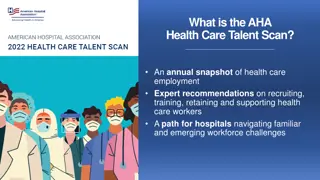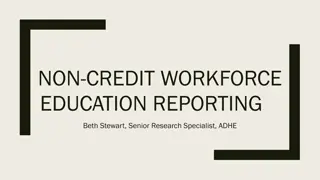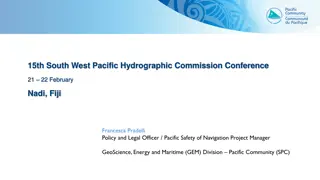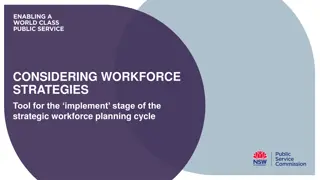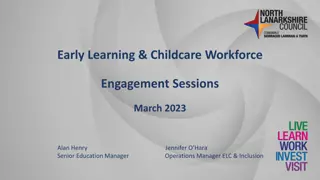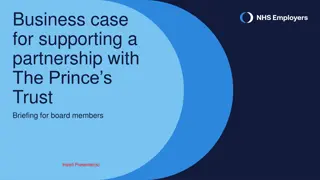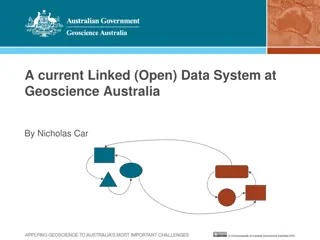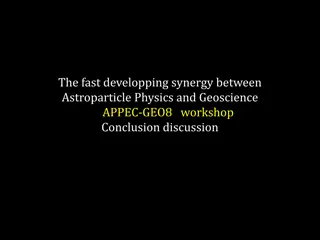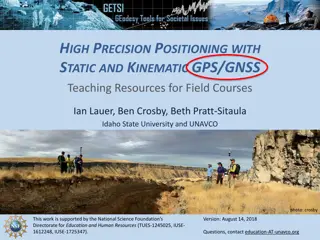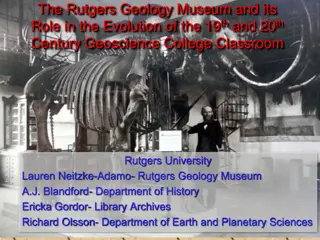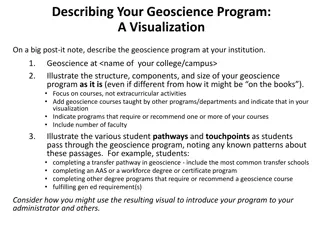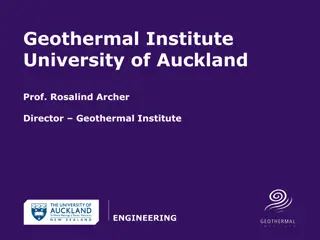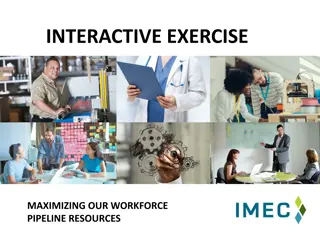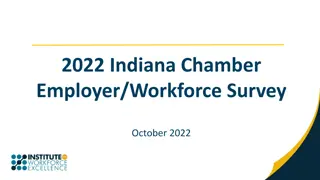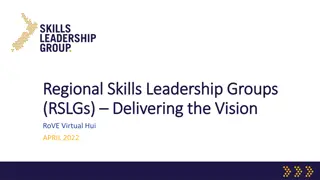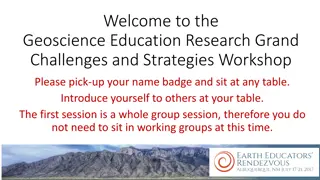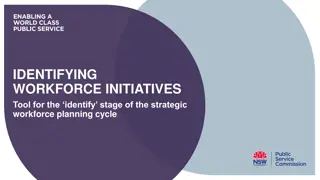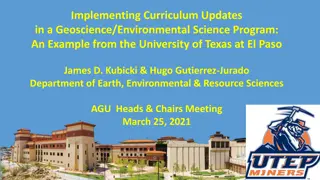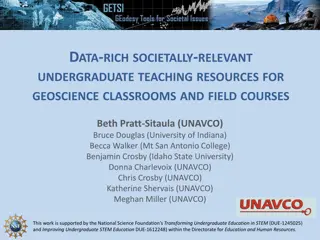Insights into the Future of Geoscience Workforce and Education
An exploration of the future landscape of geoscience workforce and undergraduate education through findings from the 2014 Summit and subsequent workshops. Emphasis on the need for multidisciplinary approaches, evolving skill sets, and integrating diverse datasets to meet the changing demands of the industry. Encouragement for developing competencies, skills, and conceptual understanding over a rigid course structure. A call for adaptation in student learning as the geoscience workforce evolves.
Download Presentation

Please find below an Image/Link to download the presentation.
The content on the website is provided AS IS for your information and personal use only. It may not be sold, licensed, or shared on other websites without obtaining consent from the author.If you encounter any issues during the download, it is possible that the publisher has removed the file from their server.
You are allowed to download the files provided on this website for personal or commercial use, subject to the condition that they are used lawfully. All files are the property of their respective owners.
The content on the website is provided AS IS for your information and personal use only. It may not be sold, licensed, or shared on other websites without obtaining consent from the author.
E N D
Presentation Transcript
AGU/AGI Webinar: Geoscience Workforce & the Future of Undergraduate Geoscience Education Sharon Mosher Jackson School of Geosciences University of Texas at Austin October 9, 2015 Results from project sponsored by
Future of Undergraduate Geoscience Education 2014 Summit: ~200 educators representing broad spectrum of undergraduate geoscience education community R1 research universities with undergraduate programs, 4-year and 2-year colleges Faculty, heads & chairs, education researchers Industry, government & professional society representatives (~20) 1st step in development a high-level community vision for the geosciences Surprising collective agreement Ongoing Community Survey 455 respondents 354 academics (78%), 76 industry (17%), 13 government (3%), 7 other (1%), 5 professional societies (1%) 85% not Summit participants Geoscience Employers Workshop (May, 2015) 46 participants: 6-7 each from energy, hydro/engineering/environmental, govt. agency, prof. societies, academics; 1 mining Plus ~13 NSF program directors Summit for Heads & Chairs January 8-10, Austin, TX
Geoscience Workforce today & in the future Need for multi-disciplinary approaches to problems More integration of different types of datasets Cross disciplinarily teamwork Different paradigms thinking about rocks in fundamentally different ways Different types of jobs for geoscientists Technological advances changing skill sets More digital & modeling skills Black box mentality without understanding how works BIG DATA manage, use, model; statistical analysis More interaction between business & society Economics/law/business practices/ethics/risk/environment Cultural diversity As the workforce changes student learning must change
Concepts, Skills, Competencies Major conclusion of Summit Developing competencies, skills, and conceptual understanding More important than taking specific courses Survey Results: Competencies, skills, and conceptual understanding vs. specific courses Academics Industry Govt. Prof. societies/other 0% 10% 20% 30% 40% 50% 60% 70% 80% 90% 100% yes no blank
Summit Outcomes/Survey Results: Important Concepts Very 1 2 3 4 5 Not Earth as complex, dynamic system with linkages between different systems (lithosphere, Deep time (including the origin & evolution of life) Climate change Natural resources (including energy) Surface processes (including relationship between landscape and process) Earth materials Earth structure Natural hazards Hydrogeology (including water, rock, microbe interactions) 0 100 200 300 400 500
Employer Workshop: Systems Thinking How systems work and interact Atmosphere Climate, Weather, Ocean-atmospheric circulation Hydrosphere Ocean, Ice, Surface water, Groundwater Lithosphere rock cycle, deformation, structure, tectonics Pedosphere/surface Geomorphic, Erosion, and Surface Processes, Landscape evolution Biosphere - Paleontology, Ecosystems Solar/Earth Interactions Tidal, Climate; planetary geology Human/Societal Coupled to Earth Natural Resources, Energy, Anthropomorphic Climate Change, Natural Hazards Influence of geology on society Influences of society on earth processes
Processes Geochemical Cycles C, H2O, N, P Thermodynamics energy, kinetics, diffusion, heat, mass transfer, fluid flow Geomechanics/Stress State/Rheology Geological Time/Earth Evolution Plate Tectonics/Geodynamics Tectonic Processes Depositional Processes Crystallization Processes
Tools Statistics/Uncertainty/Probability Mathematics (differential equations, linear algebra) Field Methods Cartography Geography and spatial thinking Potential Fields Remote Sensing Age Dating Instrumentation Analytical/Numerical Modeling Seismology/Geophysical sensing
Earth as a Complex System Non linear complex systems Size of systems complexity of scale and interactions Feedback loops, interactions, forcings Implications and predictions Energy, mass, fluid transport (movement and flow), residency, and cycles Work/changes that affect the Earth s systems Human drivers and impacts of change, Anthropocene Environmental transitions Scales of change Using the present processes to infer past processes: Advantages/risks Solar system interaction
Deep Time Conventional concepts of geologic time Paleontology, superposition Relative vs absolute age Tools to determine absolute age (radioisotopes, stable isotopes, etc.), precision of data, limitations Extrapolate from lab to field Impact on processes Time scales over which processes are relevant Specific periods in geologic time that are critical for different processes Impact of time on Earth events (i.e. weathering, geodynamics, resources, etc.) Events and rates Duration, frequency, magnitude and residence time Timing, scale, sequencing and rates of change Temporal reasoning
Climate Change What is climate change? Geologic scale vs. present change Significant climate change in geologic past Relevant space and time scales Continental vs local scale change Proxy records Rate of climate change; rapid change Driving forces and causal mechanisms External forcing vs. internal forcing Dependence upon spatial and temporal scale and feedbacks Impact of plate tectonics, atmosphere-earth interactions, etc. Human-induced climate change Carbon cycle Difference between weather and climate Impacts of climate change Water resources, hydrologic cycle, other climate change effects Biosphere implications, ocean acidification, sea level rise Implications on soil, agriculture Economics and social aspects of climate change Climate element to environmental consulting and hydrogeology as well as petroleum exploration
Natural Resources Understanding of what is included in natural resources Economic geology (commodities and finite resources) Energy, water, minerals, geologic materials Solid vs. liquid resources, geographic distribution, uses Ecosystem services, analysis of renewable and non- renewable (finite) resources Resource dependency and limits Finite resource or commodity Understanding your environment (where do our materials, energy, and medicines come from) Ore and fossil fuel supply and demand and getting it to market Time and space scale of formation and depletion, sustainability Economics and viability of resources How things are made Process from ore to refined product Process from fossil fuel to energy or material objects
Surface Processes Sediment deposition & erosion Stream/River flow, morphology, deposition, erosion, effect of floods Transport relationships (all surface processes) Magnitude and frequency relationships of surficial deposits Subsurface analogs Terrestrial and marine surface interactions Biological, chemical, and physical interactions Rates of chemical and physical changes Landscape alteration (geomorphology) Surface mechanical and chemical processes Karst formation Glacial till and overburden thickness Habitability, sustaining life Ties to natural hazards
Earth Materials What is a rock, mineral? Rock cycle Rocks: physical and chemical properties How measure, scale of measurement Mechanical characteristics Scales of heterogeneity How change over time Processes that form rocks and minerals Processes and conditions of formation Localizing mechanisms for deposits Fluid dynamics, flow and fluid chemistry Role of microbiology and organisms Resource applications, organic-inorganic materials
Earth Structure Structure of Earth Mechanical and compositional layers Tools for defining earth structure (seismic waves, analysis of earthquakes, etc.) Deformation Stress and strain Rock mechanics & deformation processes Fractures, faults, folds, other structural features, etc. Plate Tectonics, including Basin formation Episodic nature, planning perspectives, uncertainty Structural controls on resource accumulations
Hydrogeology Water cycle Groundwater/aquifers, confined vs unconfined aquifers Phase behaviors Saturated vs unsaturated conditions Scales of heterogeneity in space and time Contaminant transfer Biogeochemistry and aqueous geochemistry Microbe interactions Nutrient cycling Subsurface-surface water interactions Economics and public policy Groundwater quality Regulatory standards
Summit Outcomes/Survey Results: Science Skills Very 1 2 3 4 5 Not Critical thinking/problem solving skills Communicate effectively to scientists & non- scientists Ability to access and integrate information from different sources and to continue to learn Understand and use scientific research methods Have strong quantitative skills and ability to apply Work in interdisciplinary teams and across cultures 0 100 200 300 400 500
Summit Outcomes/Survey Results: Geoscience Skills Very 1 2 3 4 5 Not Make inferences about Earth system from observations of natural world combined with experimentation and modeling Readily solve problems, especially those requiring spatial and temporal (i.e. 3D and 4D) interpretations Work with uncertainty, non-uniqueness, incompleteness, ambiguity and indirect observations Integrate data from different disciplines and apply systems thinking Have strong field skills and a working knowledge of GIS Have strong computational skills and the ability to manage and analyze large datasets Be technologically versatile (i.e. Google Earth, tablets, smartphones, apps) 0 100 200 300 400 500
Employer Workshop: Geoscience Thinking Earth Science habits of mind/geoscientific thinking Temporal and spatial thinking Systems thinking Geologic reasoning and synthesis Problem solving in the context of an open and dynamic system Asking appropriate questions Understand context of problem Problem solving in 3- and 4-D Ability to work on problems with no clear answers Managing uncertainty in problem solving Have a passion for solving problems Working by analogy, inference and the limits of certainty Intellectually flexible - applying skills in new scenarios
Skill List (A-awareness (had in class); P-proficiency (had to use/apply); M-mastery (project, etc. requiring demonstration of ability); E-expert (MS or PHD) Level of Mastery P Critical thinking/problem solving skills P Communicate effectively to scientists & non-scientists Readily solve problems, especially those requiring spatial and temporal (i.e. 3D and 4D) interpretations Make inferences about Earth system from observations of natural world combined with experimentation and modeling Work with uncertainty, non-uniqueness, incompleteness, ambiguity and indirect observations Ability to access and integrate information from different sources and to continue to learn M M M M P Understand and use scientific research methods P Have strong quantitative skills and ability to apply P Integrate data from different disciplines and apply systems thinking M, P Have strong field skills and a working knowledge of GIS P Work in interdisciplinary teams and across cultures Have strong computational skills and the ability to manage and analyze large datasets P M Be technologically versatile (i.e. Google Earth, tablets, smartphones, apps)
Technical Skills Problem Solving with data Data collection and interpretation, use and application of data Begin with understanding of how data will answer question, purpose of collecting data Evaluation of data, data quality Understanding data and uncertainties Make predictions with limited data Use of appropriate methods, reading and interpreting graphs Quantitative/Math skills integrate into geo courses throughout Differential equations/linear algebra Probability and statistics (so understand risk) Understanding of scale Computer programming skills (think about how to solve a problem computationally) Experience with authentic research, collection of new information Critically evaluate literature, encourage critical thinking
Field and Technology Skills Field Camp and Field Experiences Improves spatial cognition, creative problem solving, teamwork, geoscience synthesis Data supports field skills are unique and essential, difficult to replicate or substitute GIS Most essential for building large data sets Ability to handle and analyze Big Data Use of visual models, modeling tools (Stella, Modflow, Matlab, etc.) Integration of technical and quantitative skills, programming, application development Technological diversity (need skills and training beyond point, click, and type) i.e. not just black box Preparation for life-long learning How to learn and use new technology and software
Non-technical Skills Oral and written communication competency Science writing and verbal communication; knowing your audience Public speaking Listening skills Project management Ability to work in teams Be a leader and follower Don t divide work; iterative process between students with different backgrounds/disciplines Goal setting Solution-oriented approaches Conflict resolution (open minded answer may lie in the conflict space) Managing problems on the front end Time management Professionalism, interpersonal skills Ethics, ethical awareness and codes of conduct Business acumen and risk management Cultural interactions, cultural literacy, emotional literacy, learning styles, awareness of implicit biases Leadership Career awareness/resume/interview preparation Global perspective Understand societal relevance
Effective Ways of Developing Skills/Competencies/Concepts Experiential learning incentivize faculty to increase use Constant engagement in opportunities to practice skills and use concepts Project based courses Collaborative, integrative team projects Interdisciplinary projects Fieldwork and field experiences Exercises using and analyzing real data Internships or REUs the earlier and more often the better Research experiences/projects Senior Theses ASBOG test as a source of problem-oriented activity for the classroom and as an incentive Use games to teach & reward innovation and creativity Integration and interactive use of technology Visualization, simulation, modeling, use of real data More active collaboration between academia and the outside employers
2016 Heads/Chairs Summit on the Future of Geoscience Undergraduate Education January 8-10, 2016 at The University of Texas at Austin Registration deadline November 15th Some travel support available http://www.jsg.utexas.edu/events/future-of- geoscience-undergraduate-education/ Purpose: Discuss results -- skills, competencies & conceptual understandings, effective ways of developing, implementation into different curriculums Discuss results of other aspects of project (retaining/recruiting underrepresented groups, science teacher preparation, etc.)
GSA town meeting: Nov. 3, 5:30-6:30 pm, Rm 336, Baltimore Convention Center Outcomes also linked: http://www.jsg.utexas.edu/events/future-of- geoscience-undergraduate-education/ Summit Summary Report Survey - ongoing Archived Summit webcasts AGU/AGI Heads/Chairs Webinars PPT slides Contact smosher@jsg.utexas.edu
ORGANIZING COMMITTEE Tim Bralower, Pennsylvania State University Jacqueline Huntoon, Michigan Technological University Peter Lea, Bowdoin College David McConnell, North Carolina State University Kate Miller, Texas A&M University Sharon Mosher, University of Texas at Austin Jeff Ryan, University ofSouth Florida Lori Summa, ExxonMobil Upstream Research Joshua Villalobos, El Paso Community College Lisa White, University of California Berkeley S SUMMIT UMMITON ONTHE THE F FUTURE UTUREOF OF U UNDERGRADUATE NDERGRADUATE G GEOSCIENCE EOSCIENCE E EDUCATION DUCATION
Sustained change in geoscience undergraduate education Combined, coordinated efforts of departments and programs Administrators, individual faculty innovators Future workforce employers Geoscience professional societies Affect culture change - administration down to student level
